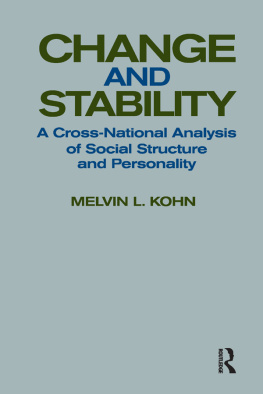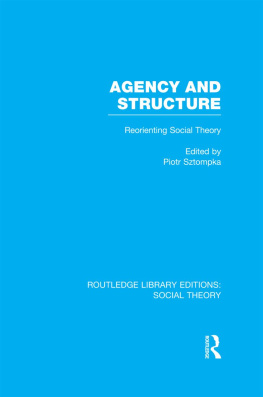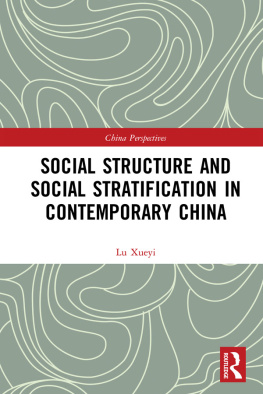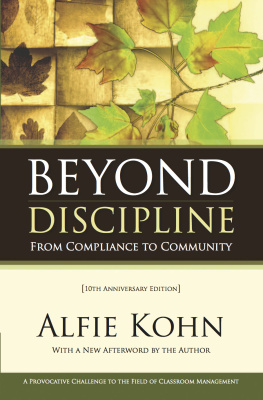UNION BRIDGE BOOKS
An imprint of Wimbledon Publishing Company Limited (WPC)
UNION BRIDGE BOOKS
7576 Blackfriars Road
London SE1 8HA
www.unionbridgebooks.com
Melvin L. Kohn 2019
The author asserts the moral right to be identified as the author of this work.
All rights reserved. No part of this publication may be reproduced in any form or by any means without written permission of the publisher.
The moral rights of the author have been asserted in accordance with the Copyright, Designs and Patents Act 1988.
A CIP record for this book is available from the British Library.
ISBN-13: 978-1-78527-066-6 (Hbk)
ISBN-10: 1-78527-066-4 (Hbk)
This title is also available as an e-book.
In the course of a very long career as a sociologist, I have written or coauthored, with my collaborators, nine books in English and a multitude of articles about our research. I had thought when I published the last of these books, Adventures in Sociology: My Life as a Cross-National Scholar, a few months ago, that I could now at long last retire and catch up on reading new books and rereading old ones. But that was not to happen quite yet. As I thought about my professional life, it seemed to me that it had been given largely to the development of a theory about the relationship of social structure and personality. I thought I had done a reasonable job of presenting this theory in the memoir, but I concluded that I still had more to do to reach my goal of presenting a fully developed theory.
Adventures in Sociology had been different from all its predecessors in that it was a true memoir, the autobiography of a social scientist. I had tried to present my life and my work together, showing how my personal relationships and the institutions in which I worked influenced my work. I had also discussed at length my conflicts with my two prominent enemies, Presidents Richard Nixon and Ronald Reagan. I was very proud of presenting my life and my work in the same book.
I had also made an early decision that Adventures in Sociology would be a book written not only for my colleagues in sociology but also for a lay audience. I made a small but highly significant change of tense in my writing. In the original publications, I had used the present tense, i.e. American respondents (obviously, at the time of some particular study) value this or that characteristic for their children, while Italian parents (obviously, at the time of that study) value this or some other characteristic. In my memoir, all of this was changed into parents in some country at some time valued some characteristic, at other times valued this or some other characteristic. I did not assume that peoples values never change.
The book was warmly accepted both by my colleagues and by my neighbors who knew nothing about sociology but who enjoyed reading the book.
There was, however, one important limitation to the memoir, as I now see it. Although the memoir includes the very last study that I did, a study of that fascinating country of China, it was written very soon after completing the fieldwork for that study. I did not then realize the full implications of that study for the larger theory. I want now to finish that important task. To do this, I have made some very important changes in the text of the memoir to suit what I want to do in fully developing a complete theory of the relationship between social structure and personality something that had been left incomplete.
For one thing, I want to emphasize the development of a theory, not the life of a particular sociologist. I have deliberately left out of this book everything about my early life that might have influenced my intellectual development, but had nothing to do with the theory that is the subject matter of this book. (For those readers who want to know more about my personal life, there is always the memoir to read.) In short, I want to focus on the task that I had left unfinished.
In particular, although my collaborators and I consistently found that social class and social stratification were the most important social factors affecting peoples values and orientations, we had also found interesting cross-national inconsistencies in peoples reactions to similar social conditions. We conscientiously presented these cross-national inconsistencies, and we even admitted that we could not entirely explain them. But now, I think I can explain them because the Chinese study has taught us a great deal more about the bearing of social structure on personality, not only in China, but everywhere.
I want to review all the studies I have conducted, but from todays perspective, looking at each study from the perspective, not of the particular findings of that study as we saw them at the time of the research, but from how it contributes to our full understanding of the similarities and differences in the relationships of social structure and personality of the different countries we have examined.
Which brings me to the most important reason for wanting to write this book. In the months since I published the memoir, I have thought a great deal about why the cross-national discrepancies occurred, and whether they undermined the theory or can be used to explicate and expand the theory. Thats the essay I really wanted to write, and the most important reason for writing this book. And this part of the book is completely new.
Finally, I have decided not to include the statistical packages that underlie the various conclusions that I have drawn. Statistical findings are exceedingly expensive to publish, and I mean to make this book available to a wider audience than could afford a book that would contain all the necessary statistical tables. Most of my readers will accept my word that the official reviewers of my research in the various journals in which I have published the original papers accepted my conclusions. Moreover, I can suggest to my present readers that, if they are interested in examining the statistical tables, most of them were printed in my book published in 2006, titled Change and Stability: A Cross-National Analysis of Social Structure and Personality and translated into Chinese by the Social Sciences Academic Press of the Chinese Academy of Social Sciences in 2007. The American edition has long since gone out of print, but it is available in many public libraries. Of course, a book published in 2006 could not contain the most important study of all, that of China. But the article that my principal Chinese collaborators, Weidong Wang and Yin Yue, and I published in Social Forces (Vol. 91, No. 2, 2012) is also readily available. It is also certainly worth reading for a presentation of how the findings of this study appeared to its authors at the time of its completion.
I must begin this review of the research I conducted in Hagerstown with an explanation: Here is the story of a spectacularly successful research project conducted under preposterous circumstances. The details may be a bit sketchy (this is a report from decades ago), but the essentials are correct. The events are anything but ordinary. The research was carried out under very strange circumstances. I was hardly qualified to conduct this research. I ran into all sorts of difficulties. And yet the research was extraordinarily fruitful.











